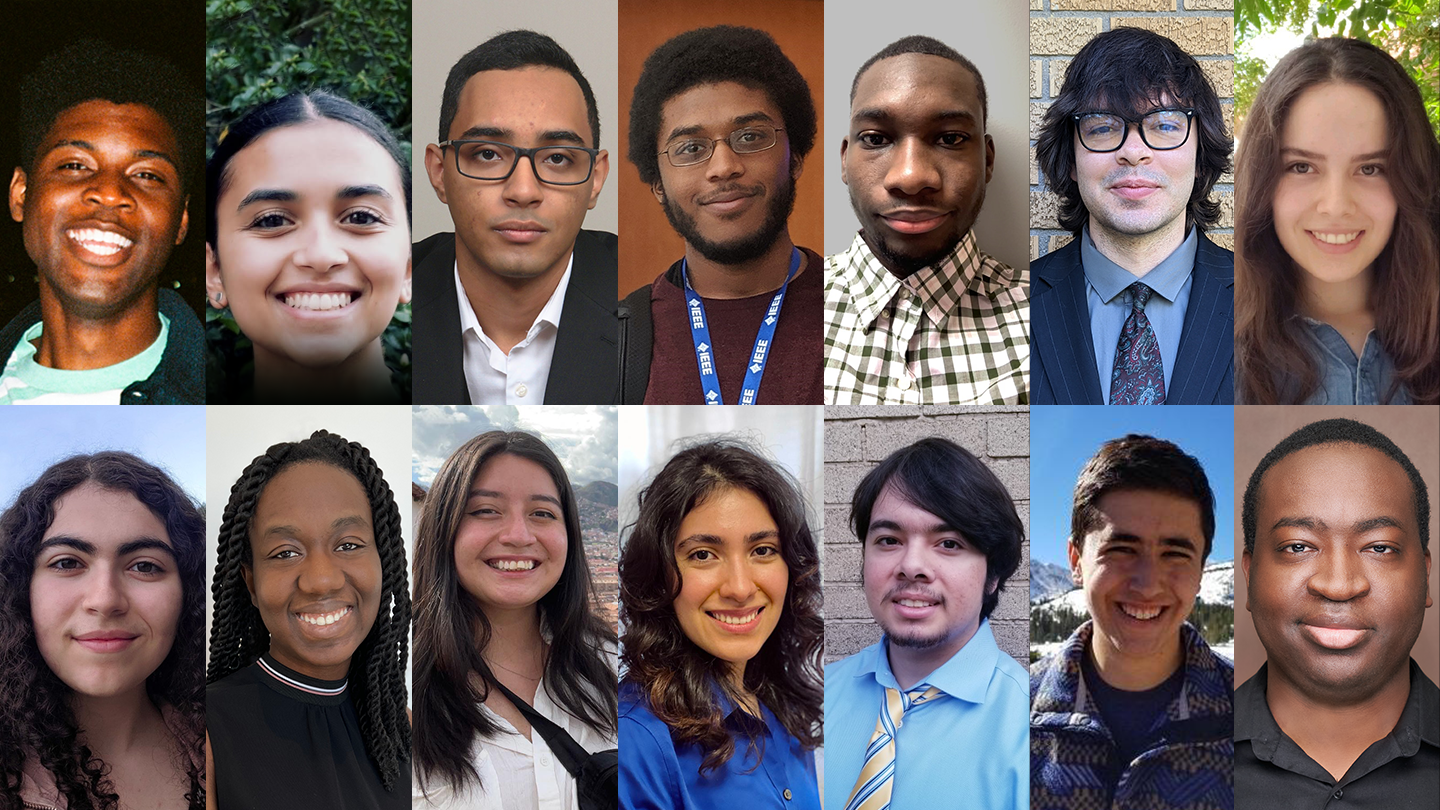Amazon Robotics recently announced fourteen new recipients of the Amazon Robotics Day One Fellowship, a program established to support exceptionally talented students from diverse technical and multicultural backgrounds who are pursuing master of science degrees. The program was developed to support emerging leaders in science from backgrounds underrepresented in STEM, awarding scholarships, mentorship, and career opportunities.
The fellowship program was launched last year with an inaugural class of six recipients across three universities. The program has expanded to support fourteen fellows across seven universities, including Brown University, Boston University, Harvard University, Massachusetts Institute of Technology, Northeastern University, Stanford University, and Worcester Polytechnic Institute.
Recipients receive fully funded fellowships in robotics, engineering, computer science, and related fields that will cover tuition, living expenses, and other costs.
Fellowship recipients also have the opportunity to participate in Amazon Robotics’ internship program. During their summer at Amazon Robotics, the Fellows connect with and receive mentorship from industry experts and members of leadership to gain hands-on experience in their chosen field. Fellows seeking full time industry positions also have the opportunity to join Amazon at the conclusion of their graduate studies.
“We have selected and invested in another outstanding class of future scientists and engineers to pursue some of the hardest problems in our field at some of the best academic institutions on the planet. We are excited to be a part of their journey to greatness,” said Tye Brady, chief technologist, Amazon Robotics.
The fourteen recipients of the 2022 Day One Amazon Robotics Fellowships are:
Omoruyi Atheka, Stanford University: Atheka will pursue his master's in mechanical engineering at Stanford University where he hopes to become an expert in robotics and develop his problem-solving skills and research independence. He will receive his bachelor’s at MIT in mechanical engineering with a concentration in optics, with a minor in design and political science. During his time at MIT, he has gained extensive knowledge relating to mechanical engineering, technology, and design.
Camille Anne Chungyoun, Stanford University: Chungyoun will pursue a master’s in robotics at Stanford University, where she hopes to conduct research in robotic locomotion and bio-inspired robotics, ultimately allowing her to work in an R&D industry position where she can use robotic locomotion to advance human health and well-being. She is currently finishing her bachelor’s in mechanical engineering, with a concentration in mechatronics, at the University of Washington.
Asbel Fontanez, Boston University: Fontanez is pursuing a master’s in robotics and autonomous systems at Boston University where he earned his bachelor’s in electrical engineering with a concentration in machine learning. In addition to spending more than 10 years participating in robotics competitions, he has also worked with engineers from Florida Power & Light, Motorola Solutions, and SpaceX. His experiences have given him a greater foundational understanding in many areas of engineering, including mechanical, electrical, and computer engineering.
Zakar Handricken, Northeastern University: Handricken is pursuing a master's in computer science at Northeastern in the Khoury College of Computer Sciences, Institute for Experiential Robotics, led by Taskin Padir. He earned his bachelor’s in computer science from Bridgewater State University where he participated in undergraduate research and worked as an intern at AcadiaSoft. He later joined Fidelity Investments as a software engineer, where he worked on projects under Fidelity's Center for Applied Technology and Data Warehouse. At Fidelity, he began his independent study of artificial intelligence to understand and research its application in robotics, data systems, and more within multidisciplinary areas.
Abubakarr Jaye, Brown: Jaye is pursuing a master’s of engineering with an emphasis on machine learning (ML) at Brown University. He received his bachelor’s in computer science and economics at the University of Illinois Urbana-Champaign. It was there he learned of ML through a friend who demonstrated an animal image neural net classifier built from scratch. His focus is currently on the application of machine learning in finance and economics.
Christopher LeBlanc, Northeastern University: LeBlanc will pursue a master's in artificial intelligence with a specialization in robotics and agent-based systems. He interned for the Louisiana Material Design Alliance, a group concerned with the innovation of novel manufacturing methods. LeBlanc obtained his bachelor's from Louisiana State University in computer science with a minor in chemistry. He decided to follow a career in artificial intelligence to satisfy his long-held curiosity about how a machine could learn. His research interests include robotics, reinforcement learning, and their applications in the automation of industrial systems.
Janeth Meraz, Brown: Meraz is pursuing a master’s degree in computer science at Brown. She earned dual bachelor's degrees in computer science and mathematics from the University of Texas at El Paso. She worked as a researcher studying the optimization of neural network weight-initialization in Diego Aguirre's Applied Intelligence Research Lab, and is a member of the Association for Computing Machinery. Meraz has also served as a mentor in the Computing Alliance for Hispanic Serving Institutions Allyship Program.
Jessie Mindel, MIT: Mindel will earn her bachelor’s in electrical engineering and computer science with an emphasis on new media at University of California, Berkeley. At the core of her work lies storytelling, placemaking, and community-centered design. She seeks to build embodied, empathetic, and narrative technologies that help people better understand themselves, more meaningfully connect with others, and more creatively explore their worlds.
Naana Obeng-Marnu, MIT: Obeng-Marnu will pursue a master’s in media arts and sciences at the MIT Media Lab under the Center for Constructive Communication. She graduated with honors from Brown University with a degree in English, nonfiction writing. She was a premier partner experience operations associate at Meta where she built frameworks and automated processes to better support creators and publishers. As secretary of the board of directors for Brown Broadcasting Service she works alongside industry leaders in new media to support and mentor Brown University students interested in media, design, and tech careers.
Kimberly Llajaruna Peralta, Harvard: Peralta will pursue a master’s degree in data science at Harvard University. She earned her bachelors from the University of Rochester in mechanical engineering and studio arts, where she also worked at Corning as a mechanical process engineer. She developed an interest in data driven decision making during her time at the Corning lens manufacturing facility while working on projects to determine optimal tolerances for manufacturing tools and to design tools that improve the precision of coaters.
Priscila Rubio, Boston University: Rubio will pursue a master’s of science in robotics and autonomous systems at Boston University. She previously interned at the National Institutes of Health, where she investigated the activation mechanism of A3 adenosine receptors. She later interned at Northrop Grumman where she worked to help design mechanical ground support equipment for the Minotaur rocket. She received her bachelors in mechanical engineering at the University of Maryland. There, she worked at US Medical Innovations and used her mechatronics knowledge to extend the capabilities of surgical instruments.
Antonio Sanchez, Worcester Polytechnic Institute: Sanchez will pursue a master’s in either soft robotics or human/robot interaction in the WPI Soft Robotics lab. He will receive his bachelor’s at Texas A&M in mechatronics, where, throughout his undergraduate career, he held several engineering internships. He is interested in embedded electronic systems, machine learning, and computer science.
Augustus ‘ Gus’ Teran, Worcester Polytechnic Institute: Teran is pursuing a master’s in robotics engineering with a focus on multi-robot systems at WPI, where he earned dual bachelor’s degrees in computer science and engineering. He was one of the authors of “Air-Releasable Soft Robots for Explosive Ordnance Disposal” which explored using soft robotics to assist in the de-mining of land mines. The paper was accepted by the IEEE International Conference on Soft Robotics.
Walter Williams, Harvard: Williams will pursue a master’s of engineering in computational science and engineering at Harvard University. He is currently finishing his bachelor's degree in computer science at University of Memphis. There he worked at the Cybersecurity Lab of the Center for Information Assurance, focusing on machine learning based applications in cybersecurity. He has also competed in machine learning competitions, finishing in the top 11% of Kaggle's 2020 Plant Pathology competition.




















